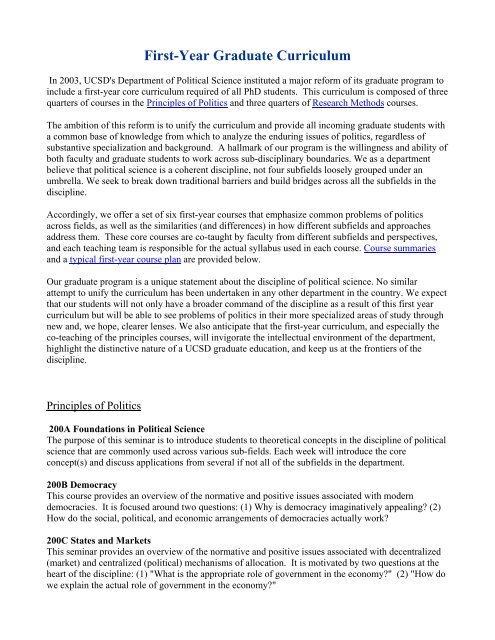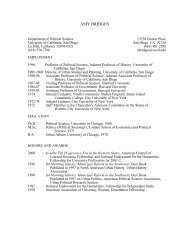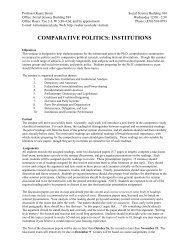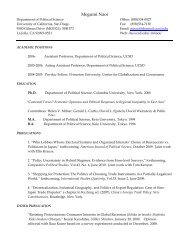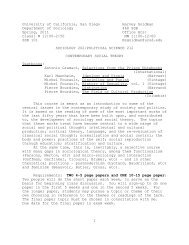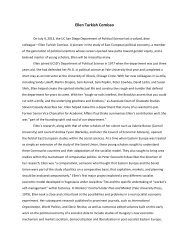First-Year Graduate Curriculum - Department of Political Science
First-Year Graduate Curriculum - Department of Political Science
First-Year Graduate Curriculum - Department of Political Science
You also want an ePaper? Increase the reach of your titles
YUMPU automatically turns print PDFs into web optimized ePapers that Google loves.
<strong>First</strong>-<strong>Year</strong> <strong>Graduate</strong> <strong>Curriculum</strong>In 2003, UCSD's <strong>Department</strong> <strong>of</strong> <strong>Political</strong> <strong>Science</strong> instituted a major reform <strong>of</strong> its graduate program toinclude a first-year core curriculum required <strong>of</strong> all PhD students. This curriculum is composed <strong>of</strong> threequarters <strong>of</strong> courses in the Principles <strong>of</strong> Politics and three quarters <strong>of</strong> Research Methods courses.The ambition <strong>of</strong> this reform is to unify the curriculum and provide all incoming graduate students witha common base <strong>of</strong> knowledge from which to analyze the enduring issues <strong>of</strong> politics, regardless <strong>of</strong>substantive specialization and background. A hallmark <strong>of</strong> our program is the willingness and ability <strong>of</strong>both faculty and graduate students to work across sub-disciplinary boundaries. We as a departmentbelieve that political science is a coherent discipline, not four subfields loosely grouped under anumbrella. We seek to break down traditional barriers and build bridges across all the subfields in thediscipline.Accordingly, we <strong>of</strong>fer a set <strong>of</strong> six first-year courses that emphasize common problems <strong>of</strong> politicsacross fields, as well as the similarities (and differences) in how different subfields and approachesaddress them. These core courses are co-taught by faculty from different subfields and perspectives,and each teaching team is responsible for the actual syllabus used in each course. Course summariesand a typical first-year course plan are provided below.Our graduate program is a unique statement about the discipline <strong>of</strong> political science. No similarattempt to unify the curriculum has been undertaken in any other department in the country. We expectthat our students will not only have a broader command <strong>of</strong> the discipline as a result <strong>of</strong> this first yearcurriculum but will be able to see problems <strong>of</strong> politics in their more specialized areas <strong>of</strong> study throughnew and, we hope, clearer lenses. We also anticipate that the first-year curriculum, and especially theco-teaching <strong>of</strong> the principles courses, will invigorate the intellectual environment <strong>of</strong> the department,highlight the distinctive nature <strong>of</strong> a UCSD graduate education, and keep us at the frontiers <strong>of</strong> thediscipline.Principles <strong>of</strong> Politics200A Foundations in <strong>Political</strong> <strong>Science</strong>The purpose <strong>of</strong> this seminar is to introduce students to theoretical concepts in the discipline <strong>of</strong> politicalscience that are commonly used across various sub-fields. Each week will introduce the coreconcept(s) and discuss applications from several if not all <strong>of</strong> the subfields in the department.200B DemocracyThis course provides an overview <strong>of</strong> the normative and positive issues associated with moderndemocracies. It is focused around two questions: (1) Why is democracy imaginatively appealing? (2)How do the social, political, and economic arrangements <strong>of</strong> democracies actually work?200C States and MarketsThis seminar provides an overview <strong>of</strong> the normative and positive issues associated with decentralized(market) and centralized (political) mechanisms <strong>of</strong> allocation. It is motivated by two questions at theheart <strong>of</strong> the discipline: (1) "What is the appropriate role <strong>of</strong> government in the economy?" (2) "How dowe explain the actual role <strong>of</strong> government in the economy?"
Research Methods204A Research DesignThis course provides a solid introduction to the principles <strong>of</strong> research design and social scientificresearch. There is no single orthodoxy in the field or in the structure <strong>of</strong> this course. Nonetheless, wefocus on issues that are common in all strands <strong>of</strong> research in political science and highlight factors thatcondition the choice <strong>of</strong> alternative research methods204B Quantitative Methods IThis course introduces students to the use <strong>of</strong> quantitative methods (particularly multiple regression andits extensions) in political science. The emphasis is on understanding the methods and using them inpolitical science applications.204C Game Theory IThis course introduces students to the rudiments <strong>of</strong> decision theory and game theory. Emphasis will beplaced on modeling and solving games.Typical <strong>First</strong>-<strong>Year</strong> Course PlanFall • 200A Foundations in <strong>Political</strong> <strong>Science</strong>• 204A Research Design• Field Requirement or Skills Course*Winter • 200B Democracy• 204B Quantitative Methods I• Field Requirement or Skills Course*Spring • 200C States and Markets• 204C Game Theory I• Field Requirement or Skills Course*Key Objectives: Complete nine courses and to start writing a seminar paper.*Skills courses refer to game theory/formal modeling, econometrics, foreign languages, or electives(lower division foreign language courses do not count toward PhD credits)Click here to return to the graduate program page. (update)


